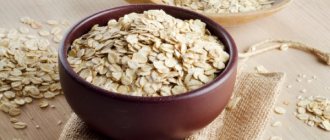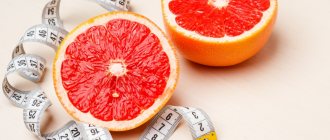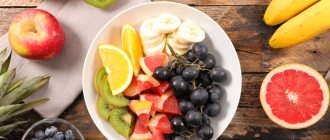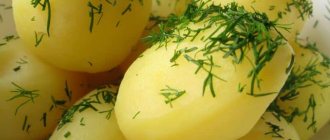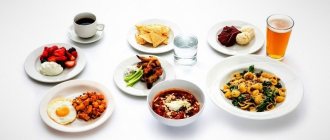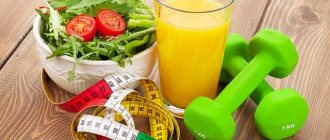A fasting day on vegetables is a great way to shift your weight in the right direction. Find out 4 good reasons to organize vegetable unloadings and 11 secrets of doing them, and also decide which vegetables are best to choose for this!
Author: Kristina Lobanovskaya, doctor, practicing nutritionist Article updated: 11/10/2020
Fasting days on vegetables are simple and easy, although not the closest path to slimness. This is a weekend for the body and its general cleaning. Vegetable unloading allows you to effectively and gently cleanse the intestines, give rest to the hard-working digestive system and at the same time shake up the body in the good sense of the word.
Who can I recommend fasting days on vegetables? With a competent approach and the absence of individual contraindications (we will dwell on them separately) for absolutely everyone. But there are situations where they are especially useful and desirable.
After the "belly festival"
Have you eaten too much? It's time to become a vegetarian for a day or two. However, no matter how much your conscience and heaviness in your stomach torment you, refrain from unloading immediately after a hearty feast. There is no need to put double stress on the body. The next day, return to your usual diet, and the next day, proceed to fasting.
During the plateau effect
Almost everyone who loses weight experiences the “plateau” effect. At first, the scales behave wonderfully, showing regular weight loss, and then suddenly they flatly refuse to give up their position. It seems that everything is being done correctly, but the device stubbornly shows the same weight. Most often, this means that the body has adapted to the nutritional system offered to it, has learned to spend calories wisely, and again needs a little shake-up. A fasting day will bring him out of the resting state, activate his metabolism and allow him to successfully continue his path to slimness.
As a general cleaning
Vegetables contain a large amount of coarse plant fiber, which works like a foam sponge. Swelling, it moves through the digestive tract, cleansing the intestinal walls and absorbing everything unnecessary and unhealthy, which is sometimes stored for years, like in any poorly cleaned apartment - in corners and closets. All these wastes, toxins, stagnant feces, fat drops, and other debris are eliminated without effort and stress in a simple and natural way. From the professional point of view of nutritionists, during such unloading, not only the intestines are cleansed, but also the lumens of blood vessels. Prevention of atherosclerosis is another advantage of vegetable days.
With stagnation of bile and insufficient water-salt metabolism
Many vegetables have diuretic and choleretic properties. If there is stagnation of fluid in the body, if the swelling is not caused by heart failure, a cucumber fasting day helps a lot. Pumpkin, carrots and tomatoes have also proven themselves excellent in this regard.
In one vegetable day you can lose up to 1.5-2 kg of weight. And yet you shouldn’t rely heavily on fasting days on vegetables for weight loss. This result is unlikely to be permanent, since the loss of body weight occurs mainly due to the loss of fluid and salts. And yet, if you arrange such days regularly, the weight will gradually but steadily decrease.
General recommendations and rules
- The optimal frequency of vegetable fasting is once a week. If you eat different vegetables, you can stretch the fasting for 2-3 days. It is better to limit the monovariant (eating only one type of vegetable) to one day.
- Meals should be frequent, with a break of no more than 2-3 hours.
- You need to drink at least two liters of clean water per day. It is better if a glass of water is not drunk in one gulp, but in small sips, like drinking moderately hot tea. Mineral water should be without gas.
- From liquids other than water, you can include unsweetened green tea, rosehip decoction or herbal infusions in your diet. But you should avoid starting your morning with green tea. It is better to take a teaspoon of flaxseed oil on an empty stomach.
- On such days, you should limit your salt intake as much as possible, or better yet, eliminate it altogether. If vegetables are difficult to cook without salt, you can sprinkle them with a few drops of lemon juice.
- Everything that can be eaten raw should be eaten raw. Boiling, stewing and baking are also allowed. However, the benefits of such food will be less. Frying is the most undesirable and even unacceptable way of heat treatment of foods for fasting days.
- Whether to stop at only one type of vegetable or to include different garden crops in the menu is something everyone chooses for themselves. But a single day is always more effective for losing weight. It’s even better if juices squeezed from them are added to the vegetables.
- High physical activity should be excluded, and it is better to choose weekends for vegetable nutrition, which are supposed to be spent in relative idleness and at home. You should not visit the gym or pool these days.
- The daily calorie content of vegetables should not exceed 1500 kcal.
- It has not been proven by science, but it has been confirmed experimentally: it is easier to endure such days during the waning phase of the moon. Against the backdrop of slow metabolic processes, the feeling of hunger is more easily tolerated.
- Do not start a fasting day if you are in a bad mood or have to force yourself. Your body does not need such feats, and it will resist. Soul and body - they must be together and at the same time! Only then will the result be exactly what we expect.
Important
During a fasting day, it is advisable to drink at least 2 liters of pure water or tea without sugar.
It is better to postpone training and any other increased physical activity to other days so as not to expose the body to additional stress.
You need to “come out” of unloading gradually. If you pounce on food the next day, there will, of course, be no effect.
There is no point in spending fasting days more than once a week. This will not increase the weight loss effect, but the metabolism may slow down due to the small amount of food.
Side effects and contraindications
Days in which you eat only vegetables, against a background of low calorie food, can cause a temporary deterioration in your overall mood and be accompanied by rapid fatigue. Dizziness and nausea may occur. Perhaps they can be corrected by changing some vegetables to others. If you experience any discomfort, it is better to postpone unloading until another time.
This detox method is contraindicated during pregnancy and breastfeeding, poor health, low blood pressure, and irritable bowel syndrome. Vegetable fasting is not compatible with problems of the gastrointestinal tract, which imply restrictions on the consumption of sour and rough foods. An exception during pregnancy may be situations when a woman gains weight too quickly, but only on the recommendation of a doctor and under his supervision.
Vegetables with a high protein content should not be consumed as a mono-diet for people with inflammatory diseases of the genitourinary system.
What's the secret?
Why is eating them good for weight loss?
But there is no secret. I have already talked in detail about a diet based on vegetables and the principles of losing weight on them, but I will repeat the main advantages:
- The presence of fiber, which perfectly helps the intestines get rid of toxins.
- Low energy value of the product with fairly good saturability (thanks to the same fibers).
- Food quite rich in vitamins and minerals. You don’t deplete your diet while dieting, which is a big plus.
- Delicious, varied menu and easy and quick preparation of dishes.
Of course, if you are allergic to any of these plants, or have diseases of the gastrointestinal tract, cholecystitis, pancreatitis or other digestive complications, you should refuse such unloading (or remove what causes the allergy).
Another possible problem is when these products are simply not absorbed by the body. In this case, of course, the doctor must decide.
Which vegetables to choose?
Vegetables, in principle, can be anything. And even those that are high in calories and rich in starch, with the right approach, can also be included in the fasting day menu. A favorite of any vegetable diets and fasting days are fresh cucumbers and zucchini. Numerous reviews of the results of unloading on cucumbers and zucchini show their high efficiency. Unloading on cabbage, tomatoes, beets, and carrots has good results.
A very desirable addition to vegetables is low-fat kefir. It goes especially harmoniously with cucumbers and potatoes.
And one more important point. Local seasonal vegetables are always preferable to imported counterparts. To ensure their safety during transportation, long-term storage and improve their presentation, chemicals are often used, which do not add any benefit to them. In addition, nutritionists claim that products grown in a person’s region of residence are the most adapted and beneficial for him.
Let's talk in more detail about the most common vegetables and one-day mono-diets.
Vegetable fasting days - benefits and harms
The beneficial effect of vegetable fasting days on the body lies in the unique chemical composition of vegetables and the properties they possess:
- due to the high fiber content, the intestines are cleansed well and waste products are removed from the body;
- metabolic processes are accelerated;
- diuretic and choleretic effect;
- due to low calorie content, excess weight is reduced;
- the level of bad cholesterol in the blood decreases;
- the body is enriched with beneficial vitamins and minerals.
But, nevertheless, such unloading also has disadvantages - due to the low caloric content of the diet, nausea, weakness, dizziness, fatigue and bad mood can be observed, and due to the fact that weight loss occurs solely due to the removal of excess fluid from the body, then by returning to your usual diet, you can quickly lose the results obtained.
In addition, unloading on vegetables has a number of contraindications, such as:
- chronic gastrointestinal diseases, especially gastritis and ulcers;
- diseases of the cardiovascular system;
- renal failure;
- various infections;
- diabetes;
- anemia;
- period of critical days in women.
As a rule, reviews of fasting days are in most cases positive; in any case, the body is cleansed, and if there is excess weight, then the number of kilograms is reduced.
Fasting day on cucumbers
Cucumbers have a low calorie content and a pronounced diuretic effect. In one day you need to try to “fit” at least a kilogram of them into yourself, or better yet one and a half, dividing this amount into 5-6 doses. You can include the same amount of low-fat kefir in the menu.
Salads made from chopped cucumbers, seasoned with 1/2-1 tsp, are well digestible and easy to eat. vegetable oil. It is better if it is taken from the list of healthy oils for weight loss. A large amount of various greens will harmoniously complement the dish and make it even more healthy and gastronomically complete. You can season the dish with kefir instead of butter. It will not be a crime if on this day you also allow yourself a small piece of boiled meat (but not pork) and one egg.
Reviews of those losing weight on cucumbers show that very often it is precisely such light fasting days that encourage those losing weight to switch to the popular cucumber mono-diet. You can “deflate” on cucumbers in one day very significantly due to large loss of fluid. Maybe not forever, but very useful.
Recommendations
Although food is strictly limited, it is only for one day, and you also have to survive it. It is best not to plan a lot of things for this day and not to get overtired at all. In addition, before planning a trip or meeting with friends on this day, you should think very carefully - after all, you risk succumbing to a forbidden delicacy.
The feeling of hunger is especially haunting in the evenings, so you should think about it in advance and stock up on kefir, apples and other low-calorie snacks. Another way out of the situation is to drink a lot of water, deceiving the body. The main thing is motivation to diet and an understanding of why you need it, then the likelihood of a breakdown is excluded.
On tomatoes
Fresh tomatoes contain only 19 kcal per 100 kcal. Moreover, even the strictest “tomato” day will not cause harm to health (in the absence of problems with the gastrointestinal tract). Moreover, tomatoes are rich in minerals and are a source of large amounts of ascorbic acid. They are an approved product for obesity and diabetes. Their juice has a beneficial effect on blood vessels, normalizing high blood pressure. Helps with chronic constipation, but does not cause bowel disorders even in their absence.
If a fasting day on tomatoes has the goal of emergency weight loss, then you need to eat 2 kg of these vegetables without salt and other seasonings. This amount is distributed approximately equally into 5-6 doses at 2-hour intervals. You should also drink 2 liters of pure still water a day in equal portions. It is not recommended to increase or decrease this volume within significant limits.
Unloading on tomatoes is contraindicated for problems with the stomach and pancreas, or cholelithiasis.
Sample menu for a fasting day based on tomatoes, including some acceptable products.
Early breakfast: freshly squeezed tomato juice - 200 ml; low-fat cottage cheese - 50 g.
Late breakfast: salad of two medium tomatoes with 1 tsp. vegetable oil and 1/2 tsp. lemon juice. 1 rye bread is allowed.
Lunch: a salad of two large tomatoes with a lot of greens (for dressing, 1 tsp of vegetable oil with lemon juice or low-fat kefir), 100 g of boiled chicken.
Afternoon snack: 1 glass of freshly squeezed tomato juice.
Dinner: a piece of boiled or steamed fish, a salad of two medium tomatoes without oil or squeezed juice from them.
Late dinner: one small tomato.
On zucchini
Zucchini is one of those rare foods that can be consumed in any quantity even if you are obese. They are eaten boiled, baked in the oven and grilled, stewed and fresh. The fried option for unloading is unacceptable. The juice from this vegetable is very good for cleansing and losing weight, but its taste, of course, is not for everyone. But the zucchini puree soup is really tasty, but it will require a little salt. You can add carrots and garlic to this soup.
Zucchini in any form is easily and fully absorbed by the body. Of the beneficial elements, it is rich in folic and ascorbic acid, potassium, and natural antioxidants, which means it prevents the processes of oxidation and cell aging. Eating it helps prevent problems with the pancreas.
In one day you need to eat 1.5 kg of zucchini in 7-8 meals, preferably without oil and spices. Renal failure should be added to the general contraindications.
On cabbage
Cabbage gives excellent results as a vegetable for a fasting day, however, this monovariant can only be used if there are no problems with the stomach and pancreas. You can use any variety of this vegetable crop - cauliflower, cabbage, Brussels sprouts, etc. It can be consumed in any form, except fried in oil. The daily norm of 1.5 kg will be approximately 400-500 kcal, depending on the method of preparation and the type of cabbage. Brussels sprouts and cauliflower are very tasty when boiled.
Don't forget to drink enough water. On cabbage days you can drink unsweetened tea.
Additional contraindications are a tendency to diarrhea and internal gastrointestinal bleeding, acute thyroid disease, pancreatitis, and increased acidity of gastric juice.
Lose weight and get healthier
After spending a fasting day on vegetables, you can lose weight from 500 g to 1.5 kg.
However, nutritionists warn that you should not expect this result to be permanent. Contrary to popular belief, fasting days are not needed for weight loss as such. Then why? First of all, they are necessary after heavy feasts - to reduce the risk of weight gain that can occur due to overeating, and to give the digestive system a rest. At the same time, it is undesirable to unload the day after the “belly festival”. Excess food is stress for the body, but too little and an unusual diet. You shouldn’t expose yourself to two “shake-ups” in a row. Have you eaten too much? The next day, eat as usual and only then unload.
Fasting days are also necessary for the so-called plateau effect. When a person goes on a diet, limiting caloric intake, at first the kilograms disappear quite quickly. But then the body adapts to the reduced amount of food, the rate of weight loss slows down, and at some point weight loss may stop altogether. A one-day fasting allows you to “surprise” your metabolism, activate it, and then the scales again go to lower levels.
And finally, a fasting day on vegetables is a great way to cleanse the body. Plant foods contain a lot of fiber, which works in the intestines like a sponge: absorbs toxins and fat drops, and then removes them naturally.
On potatoes
Potatoes are mistakenly considered an unacceptable vegetable for a fasting day if the goal is to lose weight. The nation's love for potatoes did not prevent it from being included in the forbidden list of foods for those struggling with excess weight. It does contain a large amount of starch, but the popular belief about its high calorie content is a myth.
100 g of raw root vegetables contains no more than 75 kcal, but this figure may vary depending on the method of preparation and what this dish is served with. For a fasting day, baked and boiled potatoes without salt are acceptable. Its quantity should be about 1.5 kg. When baking peeled potatoes, the calorie content will be 77 kcal, unpeeled - a little more than 80 kcal per 100 g. However, the second option is preferable, since the peel is a source of potassium, which helps remove excess salt and water from the body, and also strengthens the muscles and heart. Greens and low-fat sour cream are acceptable.
Potato days have significant benefits. They have much fewer contraindications, so even those who should not abuse tomatoes, cabbage or beets can “sit on potatoes”. Moreover, it is useful for nephritis, high blood pressure, and circulatory disorders. Of course, you won’t achieve noticeable weight loss on such a day, but you won’t feel hungry, and for many this is important.
If your blood sugar levels are high, it is recommended to pre-soak the peeled tubers in water to remove excess starch.
On carrots
Carrot fasting day - shooting at several targets at once. This is an effective cleansing of the body, a shake-up for metabolic processes, a shock dose of vitamins and other useful elements (primarily “eye” vitamin A and antioxidant substances), and an improvement in the color and condition of the skin, and an increase in hemoglobin levels.
For a fasting day, carrots need to be selected by color and size. It is better if it is brightly colored and not too large. Root vegetables weighing 130-160 g have the best indicators for the concentration of vitamins and minerals. Large carrots can be rich in nitrates, which they tend to accumulate.
Nuance No. 1. The beneficial substances contained in carrots are absorbed in combination with fat-containing foods. Therefore, despite the low-carbohydrate requirements of fasting days, this vegetable must be supplemented with a small amount of fat. Let it be healthy vegetable oil in small quantities.
Nuance No. 2. The most valuable carrot wealth is contained in the skin. Therefore, it is better to eat young root vegetables in their raw, unpeeled form.
The recommended amount is 1.5 kg per day, divided into 6-8 doses. Among the additional ingredients, honey (a little) and one fruit (kiwi, citrus fruits, apple, pomegranate) are acceptable.
In addition to general contraindications, liver disease is present. If the skin becomes severely yellowed, carrot mono-eating should be stopped once and for all to avoid the development of so-called “carrot hepatitis”.
On a pumpkin
Pumpkin is one of the vegetables allowed for fasting days for certain gastrointestinal pathologies due to its ability to accelerate the scarring of ulcers and microcracks. In terms of pectin content, one of the best “janitors” for clogged intestines, pumpkin is superior to apples and beets. It has low calorie content - only 30 kcal per 100 g.
On a fasting day, you can eat pumpkin in baked, stewed and raw form. For gastrointestinal pathologies, especially for diseases of the pancreas, it is better to exclude raw pumpkin and its juices from the menu.
Depending on the severity of the “pumpkin” day, several menu options can be recommended.
1 option
Cut pumpkin pulp (1.5-2 kg) without peel into medium pieces and bake in the oven or microwave until completely soft. It is permissible to sprinkle a pinch of cocoa or cinnamon on top. Divide the finished dish into 5-6 equal servings and consume evenly throughout the day. If you feel a strong feeling of hunger between meals, you are allowed to eat a small piece of raw pumpkin, chewing thoroughly.
Option 2 (less strict)
Recommended for those who suffer from chronic constipation.
In the morning on an empty stomach, drink a glass of freshly squeezed pumpkin juice, half diluted with water. Dry the removed seeds in the oven, but do not fry. Prepare pumpkin porridge from 1 kg of pumpkin with the addition of 150 g of rice (cook for 30 minutes). Divide the porridge into 5-6 daily doses. You can add honey and/or milk to it in minimal quantities. During breaks, you can eat dried seeds. As on any vegetable fasting day, you need to drink at least 2 liters of water.
Option 3
First breakfast: raw grated pumpkin salad with carrots and lemon juice.
Second breakfast: pumpkin porridge without sugar and seasonings.
Lunch: pumpkin puree soup with herbs. You can add carrots and zucchini to it.
Afternoon snack: a glass of diluted pumpkin juice.
Dinner: baked pumpkin pulp without seasoning.
To make it delicious
Unloading can be done on both raw and cooked vegetables. In the first case, hunger is felt more acutely. In addition, raw vegetables are more difficult to digest due to the large amount of unprocessed fiber and natural acids.
You can cook vegetables in any way that does not involve the use of oil: boil, stew without frying, bake in the oven or on the grill, place in a steamer basket. A good option is vegetable soups. Due to the liquid, they take up a lot of space in the stomach, so they give a feeling of fullness. Both liquid soups and puree soups are suitable. But the latter should consist only of water and vegetables - no flour or cream. Vegetable dishes should not be salted or peppered. It is better to diversify the taste with the help of greens or aromatic herbs.
On beets
Beetroot mono-unloading is one of the most stressful for the body. Recommended only for extremely healthy people (especially raw beets and their juice). But the result of such a day will be very noticeable.
Choose a day when you don't need to leave the house, as this vegetable has a strong laxative effect.
Beets are best consumed raw. To improve the taste of dishes and their more gentle composition, on this day you can eat a salad, including 400 g of raw apples, beets and carrots (grate on a coarse grater, add a little lemon juice and vegetable oil). Eat throughout the day in 6-7 even portions. This salad will “go through” your body like a brush, sweeping away everything that is trash and unnecessary.
If you don't tolerate monotony in food, try another option .
First and second breakfast: grate or finely chop 100 g of beets, carrots and fresh white cabbage. Rub the mixture with your hands until the juice comes out. Add 1 tsp. lemon juice and 1/2 tsp. olive or other vegetable oil useful for weight loss. Divide into two doses.
Lunch: 100 g of beetroot, carrot and apple salad. It is permissible to add 50 g of seaweed to it and season with low-fat kefir. A glass of soy or skim milk.
Afternoon snack: a glass of kefir.
Dinner: Roast 1 medium-sized beet, grate and mix with 100 g of low-fat cottage cheese and chopped herbs.
Before going to bed, add 1 tsp to a glass of water. lemon juice and drink in small sips.
Don't forget about drinking regime!
Fasting diets
Home Medical encyclopedia 100 ways to lose weight Diets for every taste
Used for overnutrition and obesity in cases where the prescribed low-calorie diet is not effective enough. Stimulate metabolism and promote the consumption of the body's own fat reserves. It is recommended to eliminate fasting days on days off from work.
All fasting diets are somewhat one-sided and violate the principle of a balanced diet. Therefore, regardless of body weight, they are recommended to be carried out 1-2 times a week. Your doctor will help you choose the appropriate diet.
A fasting day is a zigzag in nutrition, a kind of shake-up of the body, which loses 500-800 g of mass per day.
Fasting diets can be alternated. Fruit (vegetable) days are usually easily tolerated, since a sufficiently large amount of food creates a feeling of fullness and reflexively inhibits the food center. Protein foods are also well tolerated; they accelerate the absorption of carbohydrates and fats.
Based on the predominance of nutrients in fasting diets, they are divided into protein (sugar, fruit, vegetable, rice-fruit) and fat (sour cream, cream); by set of food products - vegetarian, sugar, meat and fish, liquid, combined.
Tea diet . For acute gastritis and enterocolitis - seven times a day, a glass of tea with 10 g of sugar.
Sugar diet . In case of kidney and liver failure, less often - in case of acute hepatitis and cholecystitis or their exacerbation - 5 times a day, a glass of tea with 30 g of sugar.
Curd diet. I option.
Four times a day, eat 100 g of fresh low-fat cottage cheese (preferably homemade) with wheat edible bran (1-2 teaspoons). They are pre-steamed with boiling water, and after 20-30 minutes. the liquid is drained. Cottage cheese goes well with honey, fruits, berries and vegetables, so it is advisable to add it to each serving before meals.
From a daily dose of cottage cheese (400 g), you can prepare cottage cheese casseroles with the addition of fruits, dried fruits or vegetables. In fruit casseroles there is no need for sugar, and in vegetable casseroles (sprinkled with herbs) there is no need for salt. For breakfast and dinner, it is advisable to drink an additional glass of kefir (yogurt, fermented baked milk) or rosehip decoction.
Option II.
Curd-kefir (milk) diet - 60 g of cottage cheese with 9% fat content and 1 glass of milk 5 times a day.
III option.
Eat 500 g of low-fat cottage cheese with two glasses of kefir in 5 meals.
Mixed diet . 6 glasses of warm milk.
You can eat 350 g of lean boiled meat and 50-60 g of vegetables, distributing both into 4 doses - this is also a fasting day. Meat can be replaced with boiled fish.
Vegetable diet . Eat 1.2-1.8 kg of vegetables (except potatoes) in any cooking or raw in the form of salads, vinaigrettes in six servings. For example, vinaigrette: grate 100 g of raw and 100 g of boiled beets, 100 g of raw carrots on a coarse grater, add 2 tbsp. l. green peas, 50 g of green onions, 1-2 cloves of chopped garlic, mix with finely chopped pickled cucumber, season with vegetable oil (1-2 tbsp.) and lemon juice or vinegar.
You can prepare a salad: finely chop 400 g of white cabbage, pour boiling water over it and keep in boiling water for 2-3 minutes. (to remove bitterness), drain the water, lightly squeeze the cabbage, add a little salt, season with sunflower oil or mayonnaise, adding sugar to taste.
Tomato diet. You need to eat 1.5 kg of fresh tomatoes per day, dividing them into four servings.
Juice diet . For obesity, atherosclerosis, hypertension and diabetes mellitus with obesity, kidney, liver and biliary tract diseases.
On vegetable day you can use juices (500 mg). For example, freshly prepared carrots (two parts) and beets kept in the refrigerator for at least two hours (one part). Drink the mixture in five doses and be sure to eat 150-200 g of healing fiber (squeeze), which remains after receiving the juice, plus a tablespoon of sour cream (vegetable oil). The juice should be drunk in small sips, holding it in your mouth.
Potato diet. If you have nothing but potatoes in your house, steam them (in their skins) or bake them in the oven (also with the skins). To do this, wash the potatoes thoroughly with a brush under running water, cut them lengthwise and leave for 20-25 minutes. place in the oven over high heat (skin side down, adding no salt, oil or water). Divide approximately 500 g of boiled (baked) potatoes into four servings. In addition, on this day it is recommended to drink 2 glasses of rose hips. However, after February-March it is better not to use potatoes with skins. Already at this time, a lot of solanine accumulates in it, especially in heavily sprouted and greened tubers.
Kefir diet . Drink 1-1.5 liters of fresh one-day kefir without sugar in five to six doses at regular intervals. Sour milk of all types can be combined with sweet fruits and vegetables.
Dairy diet . Drink 1-1.5 liters of milk during the day in six to eight doses. It is recommended to drink milk in small sips, keeping it in your mouth longer. This fasting day can only be used if milk is well tolerated, since not all people have lactose, an enzyme that facilitates its digestion. Less commonly, milk intolerance is caused by hypersensitivity (allergy) to milk protein. In this case, you need to boil the milk, reduce its dose, and if that doesn’t help, then switch to fresh lactic acid products (kefir, fermented baked milk) or skim goat’s milk.
Fish diet . Eat 100 g of unsalted boiled fish with a side dish (cabbage, cucumbers, tomatoes) 5 times a day. For breakfast and lunch, you can drink a glass of tea without sugar, coffee with lemon or rosehip infusion.
Meat diet . I option.
Divide 400 g of lean meat, cooked without salt, into four servings, eating each portion with a vegetable (except potatoes) side dish (150-300 g). In addition, on this day, it is advisable to drink a glass of unsweetened tea (rosehip decoction) for breakfast and dinner.
Option II.
200-250 g of lean boiled meat, 2 glasses of tea without sugar and 1-2 glasses of any juice. Divide the food into 5-6 meals.
Diet of dried fruits . For hypertension, circulatory failure, nephritis, diseases of the liver and biliary tract - 100 g of soaked prunes or dried apricots or boiled raisins 5 times a day.
Watermelon diet. For hypertension, circulatory failure, nephritis, gout, liver and biliary tract diseases, obesity - 300-400 g of watermelon pulp 5 times a day.
Rice-compote diet . For hypertension, circulatory or kidney failure, liver and biliary tract diseases - 6 times a day, a glass of sweet compote, 2 times along with sweet rice porridge, cooked in water without salt. Per day 1.5 kg of fresh or 240 g of dry fruits, 50 g of rice, 120 g of sugar.
Oatmeal diet . For colds, diabetes mellitus, atherosclerosis with obesity - 140 g of oatmeal with water 5 times a day; only 700 g of porridge (200 g of oatmeal); 1-2 glasses of tea and rosehip decoction.
Salad diet . For obesity, atherosclerosis, hypertension and diabetes mellitus with obesity, nephritis, liver and biliary tract diseases - fresh raw vegetables and fruits, their combinations 5 times a day, 250-300 g without salt with the addition of vegetable oil or sour cream.
Sour cream (fat) diet. For obesity, and less often for diabetes with obesity, 80 g of sour cream with 20-30% fat content 5 times a day and 1-2 glasses of rose hip decoction.
Cucumber diet . 1.5 kg of fresh cucumbers (15-20 pieces) are divided into five servings. For dinner, you can additionally eat 50 g of boiled meat (or one egg, 2-3 g of table salt) and drink a glass of unsweetened tea (rose hip decoction). Due to the low calorie content of cucumbers, they can be used more often on fasting days.
Apple diet. Divide 1.5-2 kg of raw apples into five servings, raw or as apple dishes. For example, a salad: grate 300 g of ripe, peeled and seeded apples on a coarse grater, mix with finely diced parsley and celery roots (50 g each), after removing the thin film covering them from the roots, season with lemon juice (40-50 d) and mayonnaise. Add salt and pepper to taste.
Another recipe: apple and onion salad. Grate two washed sour apples with shavings, add a head of finely chopped onion, parsley and mayonnaise. Apples can be replaced with soaked dried apricots (500 g) or prunes. For dinner, you should additionally drink a glass of tea without sugar or rosehip decoction.
Apples are an excellent tonic. If you are tired, eat an apple and you will feel much more energetic.
| print version | This information is not a guide to self-treatment. A doctor's consultation is required. |
On vegetable juices
If you need quick and noticeable results, you can spend a fasting day on vegetable juices. Possessing high biological activity, they stimulate metabolic processes and the movement of fluids in the body, including lymph and bile. Despite the lack of coarse fiber, vegetable juices perfectly cleanse the body at a deep intracellular level.
It should be borne in mind that drinking juices does not eliminate the need to drink water. It extinguishes the excess acid present in many vegetables and performs its own functions in metabolic processes.
Contraindications related to vegetable monodays become even more strict in relation to juices.
The result of the struggle for harmony
How much can you save this way? On fasting days, you lose about a kilogram of weight, but in reality you can lose 300-400 g of weight at a time (the rest is water).
It would seem not a lot, but if you practice such days 2-4 times a month, then the result will accordingly increase.
Therefore, if you are not in the mood to radically change your diet and approach to physical activity (namely, these are the pillars of any sustainable weight loss), and do not like to go on diets for a long time, then periodic unloading of the body is probably just what you need.
And if you choose anything as a “dish of the day,” then vegetables are almost perfect here.



